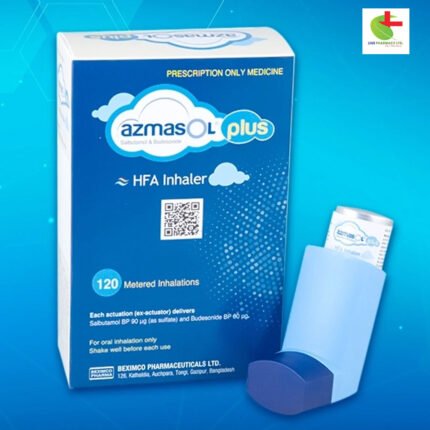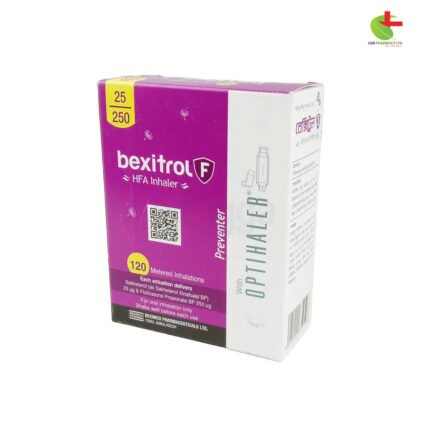Decomit HFA-100
270.00৳ Puff
- Decomit Inhaler: Designed for preventive asthma management in adults and children.
- Active Ingredient: Beclometasone dipropionate provides effective anti-inflammatory action with fewer side effects than systemic corticosteroids.
- Usage: Suitable for mild, moderate, and severe asthma; may reduce or eliminate the need for oral corticosteroids.
- Administration: Use regularly for optimal benefits; follow specific inhaler techniques and cleaning instructions.
 Brand
Brand
|
Beximco Pharmaceuticals Ltd |
|---|---|
 Generics
Generics
|
Beclomethasone Dipropionate |
 Type
Type
|
Inhaler |
Indications
Decomit Inhaler is used for the preventive management of asthma in both adults and children, whether the condition is mild, moderate, or severe. Beclometasone dipropionate, administered via inhalation, provides an effective preventative treatment for asthma, offering robust anti-inflammatory effects with fewer side effects compared to systemic corticosteroids.
- Mild Asthma: Suitable for patients who need regular use of symptomatic bronchodilator medications.
- Moderate Asthma: Recommended for patients with unstable or worsening asthma despite the use of prophylactic therapy or bronchodilators alone.
- Severe Asthma: Ideal for those with severe chronic asthma or who rely on systemic corticosteroids for symptom control. Transitioning to high-dose inhaled beclometasone dipropionate may significantly reduce or even eliminate the need for oral corticosteroids.
Pharmacology
Beclometasone dipropionate is known for its anti-inflammatory and vasoconstrictor properties. Although the exact mechanisms behind its anti-inflammatory effects are not fully understood, it influences a range of cells and mediators involved in inflammation. This pro-drug, which weakly binds to glucocorticoid receptors, is converted into its active form, beclomethasone-17-monopropionate (B-17-MP), offering high topical anti-inflammatory activity.
Clinical studies have shown no histopathological changes in nasal mucosa when beclometasone dipropionate is administered intranasally.
Dosage
Decomit Inhaler is intended for oral inhalation only. The initial dose of beclometasone dipropionate should be tailored to the severity of the asthma. Adjustments should be made based on the patient’s response, aiming for the minimum effective dose.
- Adults (including the elderly): Start with 200 micrograms twice daily. For severe cases, the dose may be increased to 600-800 micrograms per day and then reduced as symptoms stabilize. The total daily dose can be split into two, three, or four administrations.
- Children: Administer 50-100 micrograms two, three, or four times daily, or 100-200 micrograms twice daily. The typical starting dose is 100 micrograms twice daily. Note: Beclometasone 250 Inhaler is not recommended for children.
- Beclometasone 250 HFA Inhaler: Begin with 200 micrograms twice daily. For severe cases, increase to 600-800 micrograms per day and adjust as needed. The daily dose can be divided into two, three, or four doses.
No dose adjustment is necessary for patients with hepatic or renal impairment. Always follow your doctor’s advice for medication usage.
Administration Instructions
Using an inhaler correctly is crucial for effective asthma management. Follow these steps for proper use:
- Remove the cap.
- Shake the inhaler vigorously for at least six times before each use.
- If new or unused for a week, shake and release one puff into the air to ensure proper operation.
- Exhale fully, hold the inhaler upright, and place the mouthpiece between your teeth with closed lips.
- While breathing deeply and slowly, press the canister to release the medicine.
- Remove the inhaler from your mouth and hold your breath for at least 10 seconds or as long as comfortable.
- If multiple puffs are prescribed, wait one minute between each, shaking the inhaler well before each use.
- Replace the cap and rinse your mouth with water after each use.
- Check your technique in the mirror. If you see a mist, you may not be using the inhaler correctly. Repeat steps 4-7 if needed.
Cleaning Instructions: Clean your inhaler weekly. Remove the canister and rinse the plastic actuator and cap in warm water (avoid wetting the canister). Dry thoroughly and reassemble.
Always follow your doctor’s advice for medication usage.
Contraindications
Do not use if you have hypersensitivity to any components. Use with caution in patients with active or latent pulmonary tuberculosis.
Side Effects
Possible systemic effects of inhaled corticosteroids, particularly at high doses or long-term use, may include Cushing’s syndrome, growth retardation, decreased bone mineral density, cataracts, and glaucoma.
Pregnancy & Lactation
Safety in pregnancy is not well-established. Corticosteroid use in pregnant animals has been linked to developmental abnormalities. Weigh the benefits and risks of using beclometasone dipropionate if breastfeeding.
Precautions & Warnings
Ensure patients are properly instructed on inhaler use and technique. Regular daily use, even when asymptomatic, is necessary for optimal benefits.
Therapeutic Class
Respiratory Corticosteroids
Storage Conditions
Store below 30°C, away from direct sunlight and heat. Do not break, puncture, or burn the canister. Keep out of reach of children and avoid contact with eyes.













Reviews
There are no reviews yet.